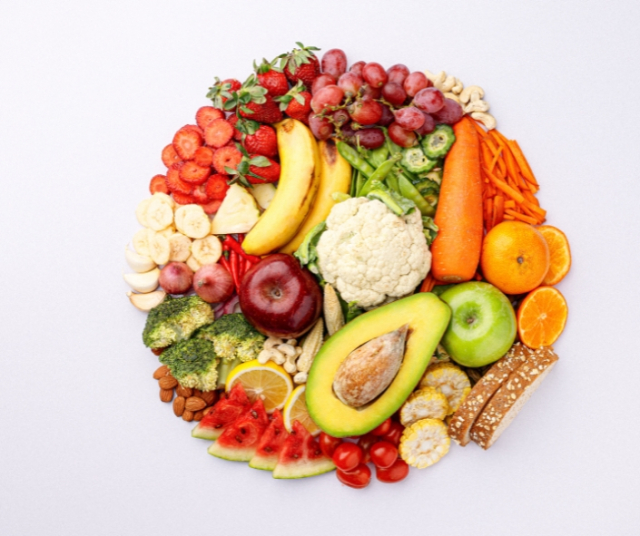Fruits and vegetables are essential components of a balanced and healthy diet. These foods are full of vitamins, minerals, fiber and antioxidants that are essential for maintaining health and preventing disease. However, while regular consumption of fruits and vegetables offers a number of health benefits, it also presents some important challenges and considerations. In this article, we will explore in depth both the virtues and challenges associated with eating fruits and vegetables, providing concrete examples to illustrate each point.
Virtues of consuming fruits and vegetables.
Essential nutrients for health.
Fruits and vegetables are rich in a wide range of essential nutrients that are essential for health. These include vitamins such as vitamin C, vitamin A, vitamin K and folate, as well as minerals such as potassium, magnesium and calcium. Eating a variety of fruits and vegetables can help ensure our body gets the nutrients it needs to function optimally and stay healthy.
Example: Oranges.
Oranges are an excellent source of vitamin C, which is crucial for strengthening the immune system and fighting disease. They are also rich in fiber, which promotes digestive health and helps keep blood sugar levels stable.
Fiber for digestion and satiety.
Fruits and vegetables are naturally rich in fiber, an important nutrient that plays several roles in the body. Fiber helps promote digestive health by preventing constipation and keeping the gastrointestinal tract in good working order. Additionally, fiber also helps promote feelings of satiety, which can aid in weight control and appetite management.
Example: Broccoli.
Broccoli is an excellent source of fiber, which is essential for healthy digestion and the prevention of constipation. Additionally, broccoli also contains antioxidants that can help reduce the risk of chronic diseases such as cancer and heart disease.
Antioxidants for cellular health.
Many fruits and vegetables are rich in antioxidants, compounds that help protect the body's cells from damage caused by free radicals. Oxidative stress caused by free radicals has been associated with premature aging and the development of chronic diseases such as cancer, heart disease and diabetes.
Example: Berries.
Berries, such as strawberries, blueberries, and raspberries, are rich in antioxidants such as polyphenols and vitamin C. These antioxidants can help protect the body's cells against oxidative damage and promote heart and brain health.
Challenges of consuming fruits and vegetables.
Pollution by pesticides and chemicals.
Although fruits and vegetables are healthy foods, they are often exposed to pesticides and chemicals during growing. Consumption of contaminated fruits and vegetables may increase the risk of exposure to pesticide residues, which has been associated with several health problems, including neurological and reproductive problems.
Example: Strawberries.
Strawberries are known to be one of the fruits most contaminated with pesticide residues. The Environmental Working Group (EWG) has classified strawberries as one of the "Dirty Dozen" fruits and vegetables that contain the highest levels of pesticide residues.
Natural sugar content.
Although the natural sugar present in fruits is better than the added sugar found in processed foods, it can still contribute to the total sugar intake in the diet. Excessive consumption of high-sugar fruits, such as mangoes and grapes, can have a negative impact on blood sugar levels and the risk of metabolic diseases.
Example: Bananas.
Bananas are a fruit naturally high in sugars, especially fructose. Although they are a healthy source of nutrients such as potassium and vitamin C, it is important to consume them in moderation, especially for people with diabetes or blood sugar control problems.
Food allergies and intolerances.
Some people may experience food allergies or intolerances to certain fruits and vegetables. Food allergies can trigger a variety of symptoms, ranging from mild, such as an itchy mouth and throat, to severe, such as difficulty breathing and anaphylaxis.
Example: Peanuts.
Although peanuts are technically legumes and not tree nuts, they can trigger serious allergic reactions in some people. Peanut allergies are one of the most common food allergies and can be life-threatening in severe cases.
Strategies for a healthy intake of fruits and vegetables.
Despite the challenges associated with eating fruits and vegetables, there are strategies that can help maximize their health benefits and minimize the risks:
- Opt for organic products: Opting for certified organic products can help reduce exposure to potentially harmful pesticides and chemicals.
- Washing and peeling: Washing and peeling fruits and vegetables can help remove pesticide residues and reduce the risk of contamination.
- Diversify your diet: Eating a variety of fruits and vegetables can help ensure balanced nutrient intake and minimize the risk of food allergies.
- Consume in moderation: Consuming fruits and vegetables in moderation can help avoid excess sugar and reduce the risk of digestive problems.
Fruits and vegetables are fundamental components of a healthy, balanced diet, providing a wide range of essential nutrients and health benefits. However, it is important to be aware of the challenges and considerations associated with its consumption, such as pesticide contamination, natural sugar content, and the risk of food allergies. By taking steps to maximize the benefits and minimize the challenges of consuming fruits and vegetables, we can make the most of these nutritious foods and promote optimal health throughout life.






